辽宁大连 Book 4 Module 1 Life in the future Listening, everyday English[下学期]
文档属性
| 名称 | 辽宁大连 Book 4 Module 1 Life in the future Listening, everyday English[下学期] | 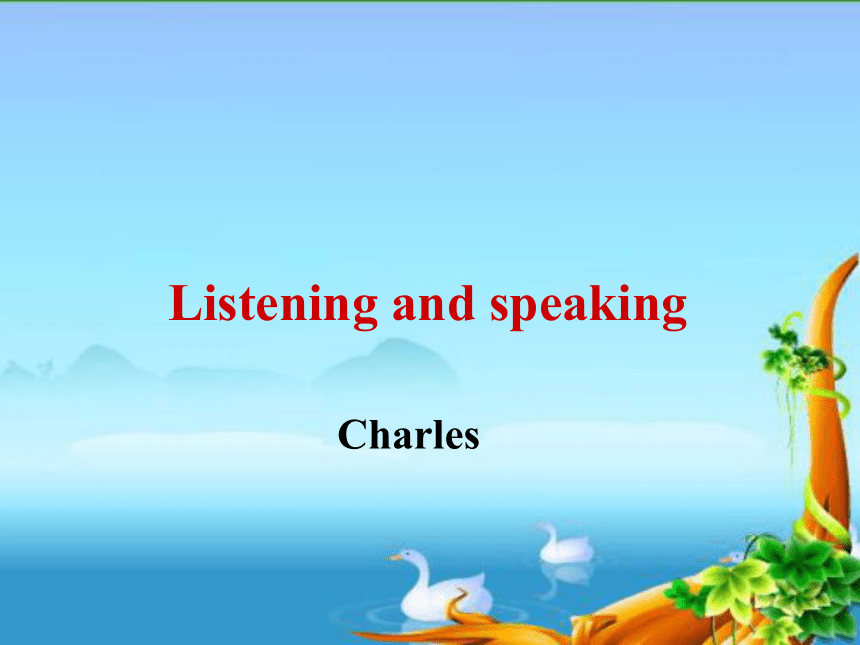 | |
| 格式 | rar | ||
| 文件大小 | 706.4KB | ||
| 资源类型 | 教案 | ||
| 版本资源 | 外研版 | ||
| 科目 | 英语 | ||
| 更新时间 | 2007-05-18 15:28:00 | ||
图片预览

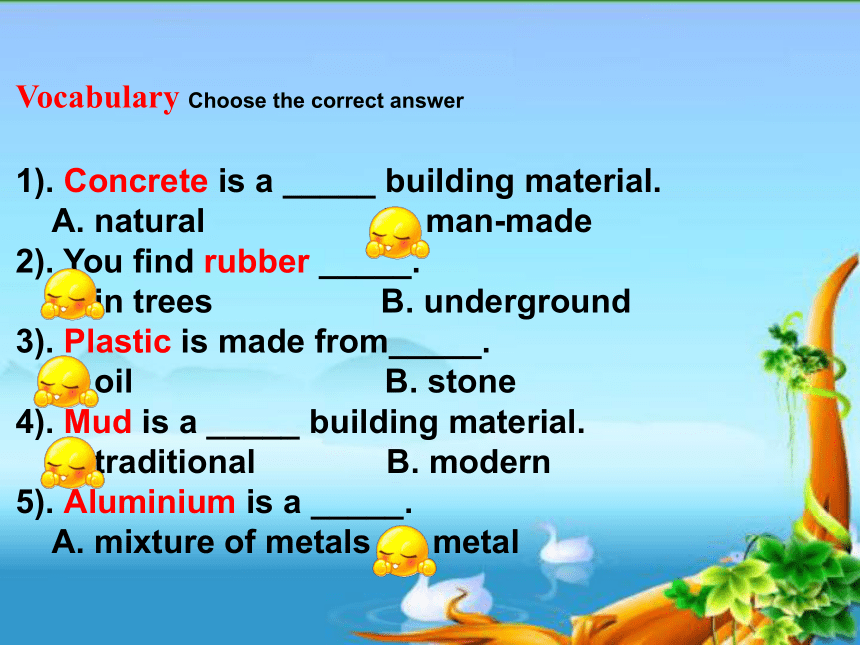
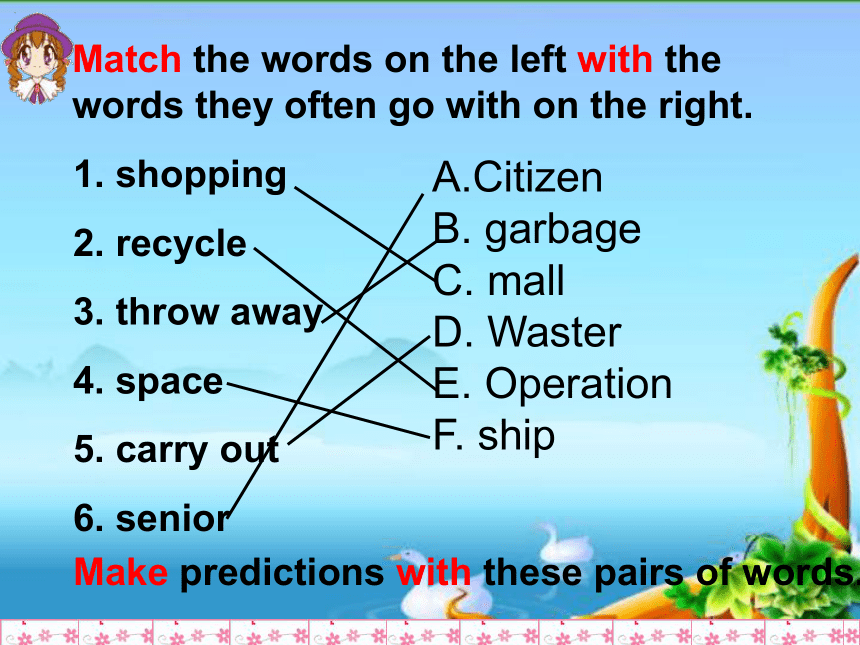
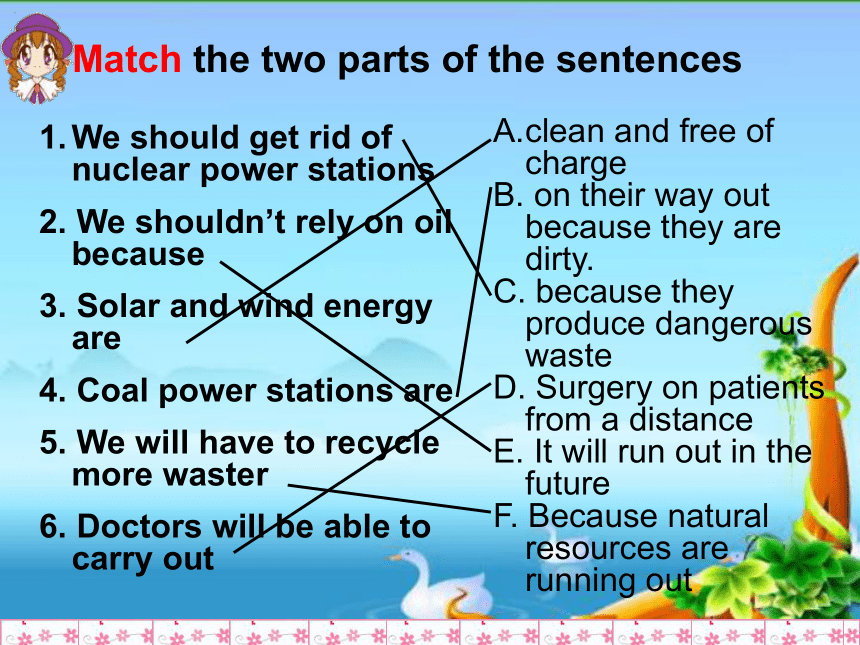
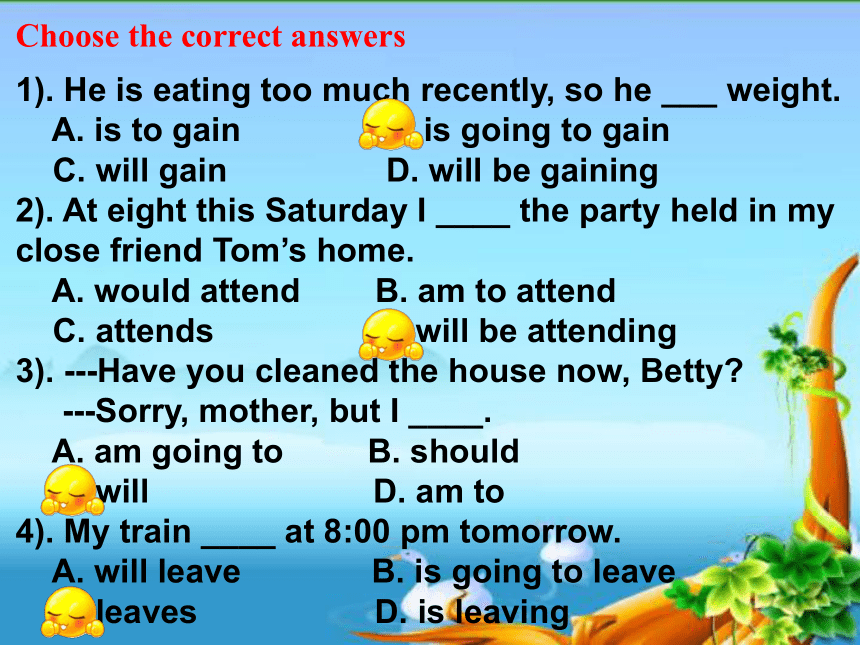
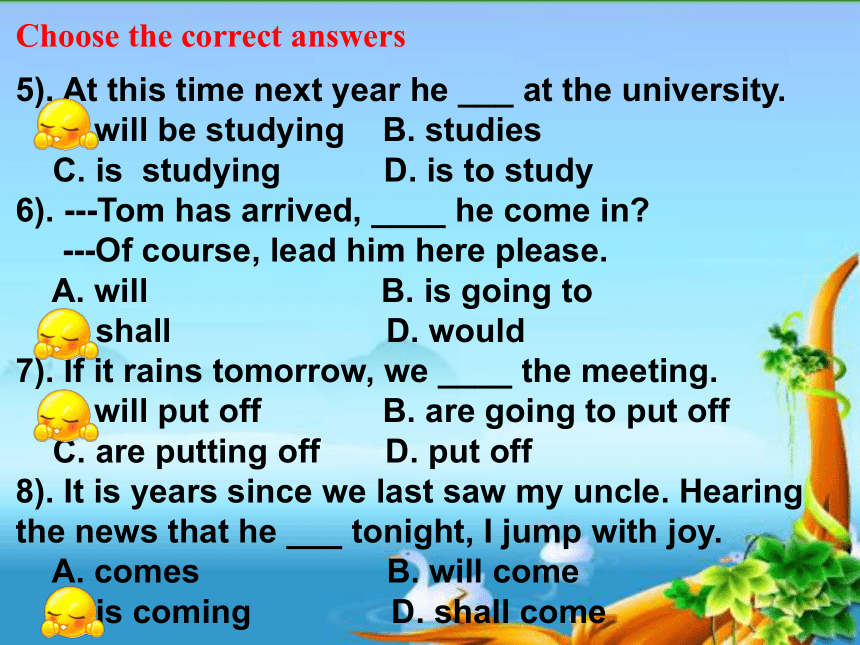
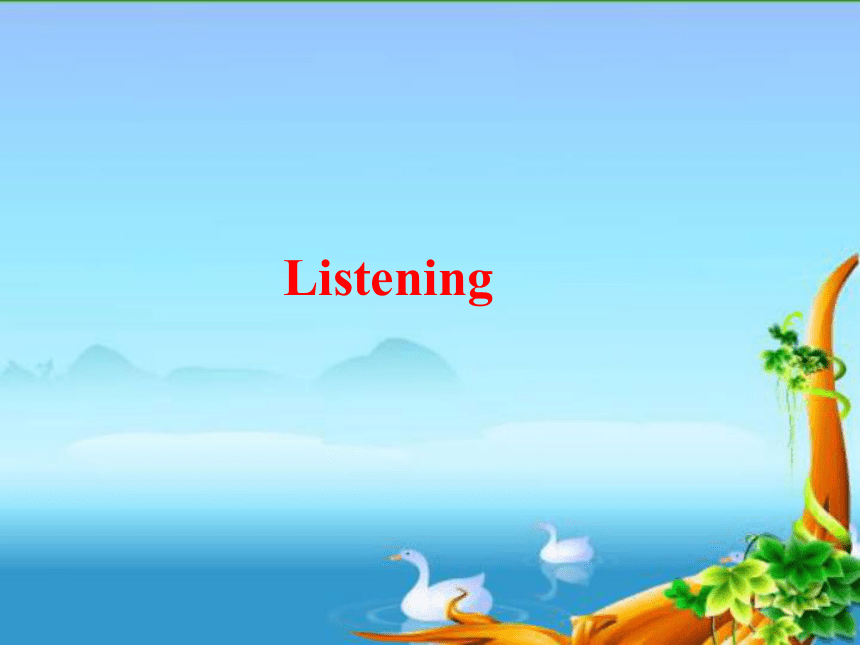
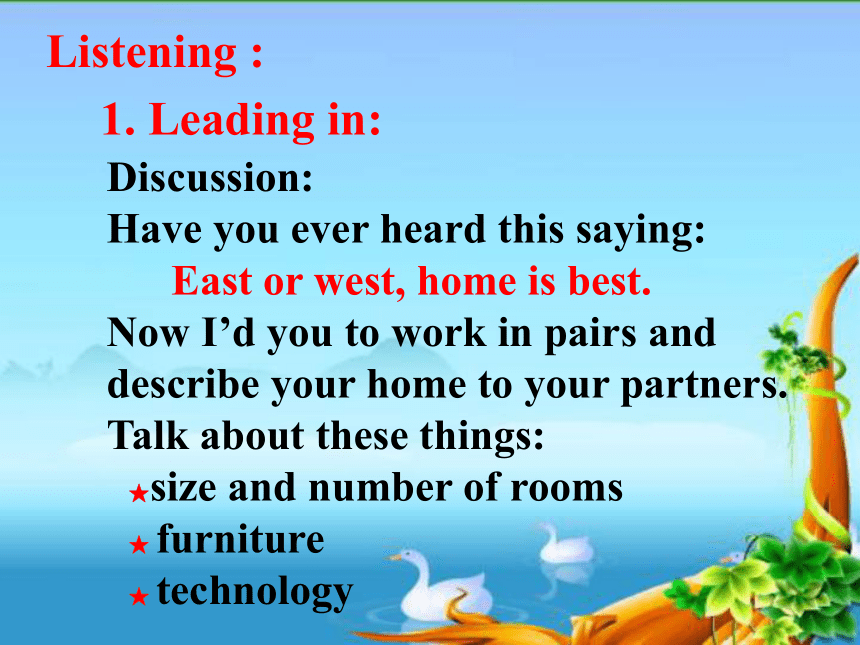
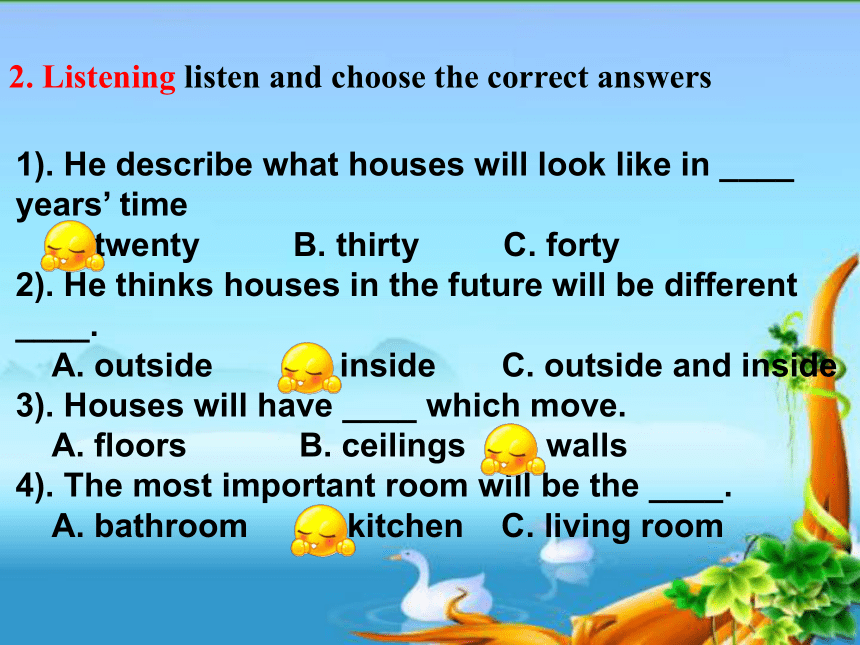
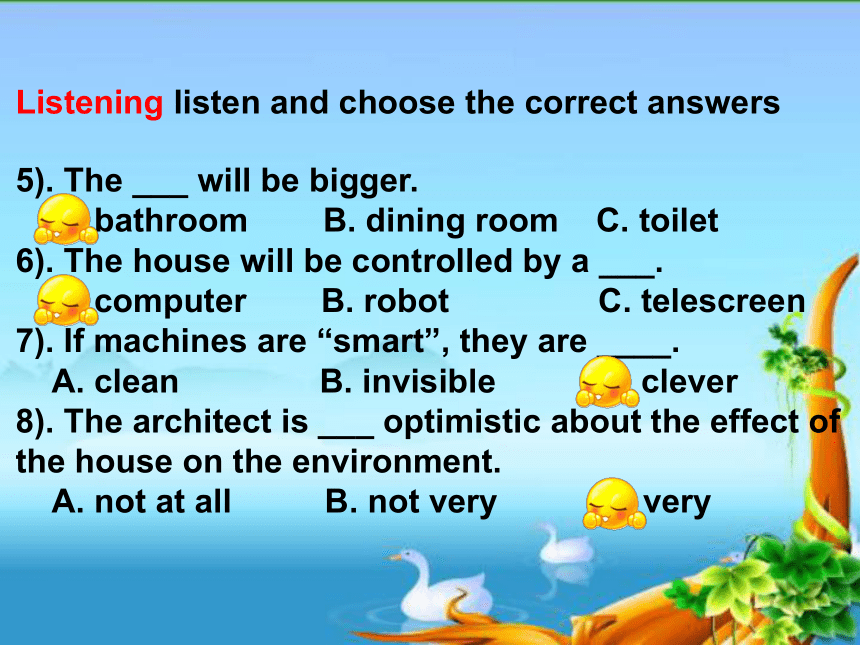
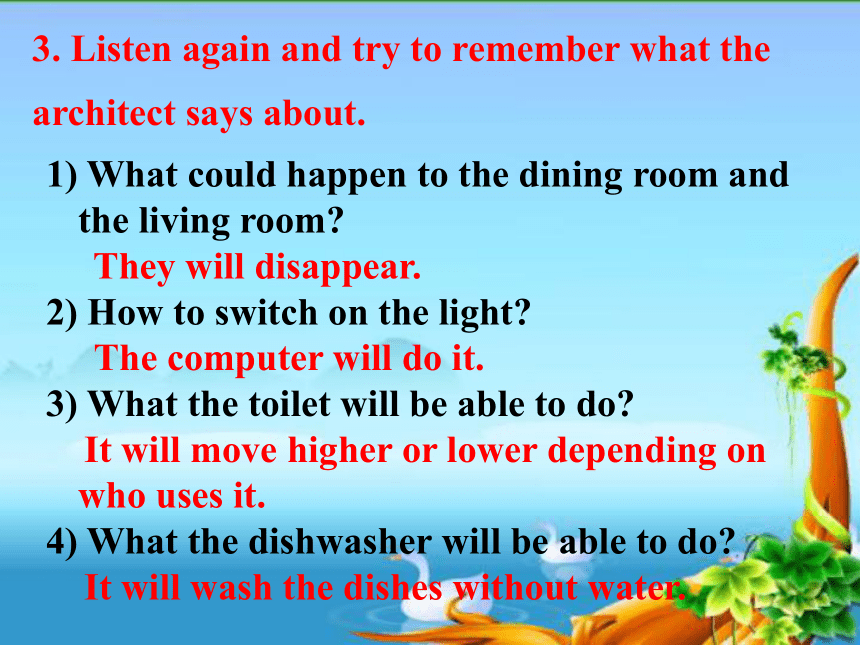
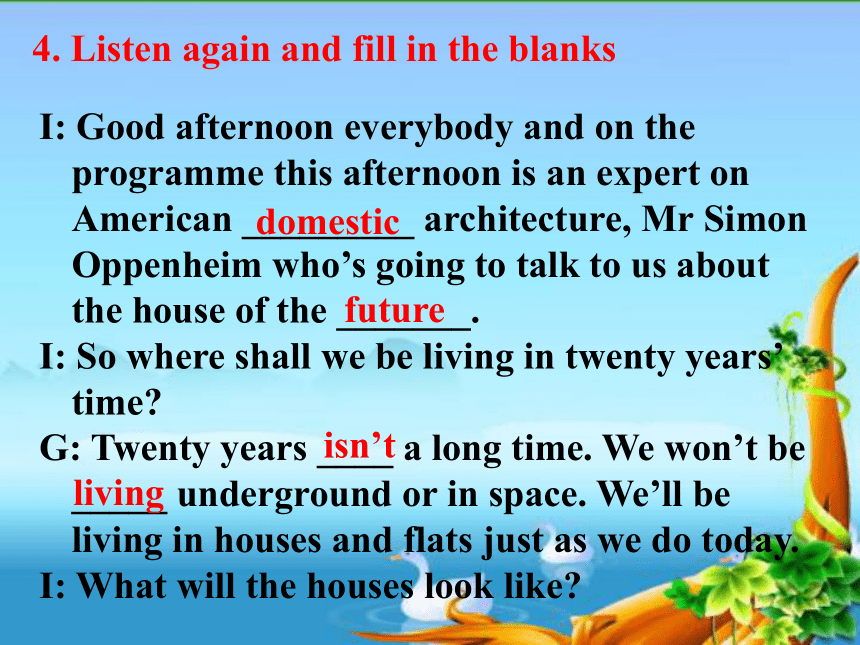
文档简介
课件49张PPT。CharlesListening and speaking1). Concrete is a _____ building material.
A. natural B. man-made
2). You find rubber _____.
A. in trees B. underground
3). Plastic is made from_____.
A. oil B. stone
4). Mud is a _____ building material.
A. traditional B. modern
5). Aluminium is a _____.
A. mixture of metals B. metalVocabulary Choose the correct answerMatch the words on the left with the words they often go with on the right.Citizen
B. garbage
C. mall
D. Waster
E. Operation
F. ship1. shopping
2. recycle
3. throw away
4. space
5. carry out
6. seniorMake predictions with these pairs of words.Match the two parts of the sentencesclean and free of charge
B. on their way out because they are dirty.
C. because they produce dangerous waste
D. Surgery on patients from a distance
E. It will run out in the future
F. Because natural resources are running outWe should get rid of nuclear power stations
2. We shouldn’t rely on oil because
3. Solar and wind energy are
4. Coal power stations are
5. We will have to recycle more waster
6. Doctors will be able to carry out1). He is eating too much recently, so he ___ weight.
A. is to gain B. is going to gain
C. will gain D. will be gaining
2). At eight this Saturday I ____ the party held in my close friend Tom’s home.
A. would attend B. am to attend
C. attends D. will be attending
3). ---Have you cleaned the house now, Betty?
---Sorry, mother, but I ____.
A. am going to B. should
C. will D. am to
4). My train ____ at 8:00 pm tomorrow.
A. will leave B. is going to leave
C. leaves D. is leavingChoose the correct answers5). At this time next year he ___ at the university.
A. will be studying B. studies
C. is studying D. is to study
6). ---Tom has arrived, ____ he come in?
---Of course, lead him here please.
A. will B. is going to
C. shall D. would
7). If it rains tomorrow, we ____ the meeting.
A. will put off B. are going to put off
C. are putting off D. put off
8). It is years since we last saw my uncle. Hearing the news that he ___ tonight, I jump with joy.
A. comes B. will come
C. is coming D. shall comeChoose the correct answersListening 1. Leading in:Discussion:
Have you ever heard this saying:
East or west, home is best.
Now I’d you to work in pairs and describe your home to your partners.
Talk about these things:
★size and number of rooms
★ furniture
★ technologyListening :1). He describe what houses will look like in ____ years’ time
A. twenty B. thirty C. forty
2). He thinks houses in the future will be different ____.
A. outside B. inside C. outside and inside
3). Houses will have ____ which move.
A. floors B. ceilings C. walls
4). The most important room will be the ____.
A. bathroom B. kitchen C. living room2. Listening listen and choose the correct answers5). The ___ will be bigger.
A. bathroom B. dining room C. toilet
6). The house will be controlled by a ___.
A. computer B. robot C. telescreen
7). If machines are “smart”, they are ____.
A. clean B. invisible C. clever
8). The architect is ___ optimistic about the effect of the house on the environment.
A. not at all B. not very C. veryListening listen and choose the correct answers3. Listen again and try to remember what the
architect says about.1) What could happen to the dining room and the living room?
They will disappear.
2) How to switch on the light?
The computer will do it.
3) What the toilet will be able to do?
It will move higher or lower depending on who uses it.
4) What the dishwasher will be able to do?
It will wash the dishes without water.4. Listen again and fill in the blanksI: Good afternoon everybody and on the programme this afternoon is an expert on American _________ architecture, Mr Simon Oppenheim who’s going to talk to us about the house of the _______.
I: So where shall we be living in twenty years’ time?
G: Twenty years ____ a long time. We won’t be _____ underground or in space. We’ll be living in houses and flats just as we do today.
I: What will the houses look like?domesticfutureisn’tliving 4. Listen again and fill in the blanksG: I think they’ll look much the same as they do today, at least from the outside. But they will be different ______.
I: In what way?
G: For a _____, they’ll be more ______. That means we’ll be able to move the walls to _____ bigger or smaller rooms when we want to. So the dining room and living room as we know them would _________.
I: And the _______?
G: The kitchen will become the most important room in the house! We’ll still be _______, and we’ll probably be ______ the kitchen more as a family room. And __________ will be bigger.insidestartflexible create disappearkitchencookingusing bathrooms4. Listen again and fill in the blanksI: So we’ll be ________ more time in the bath.
G: Just as other people have done in the past, like in the days of the ancient Romans, ____ the bath had an important _______ fun_ction…
I: What about ________?
G: Well, a lot of furniture will be the same---we’ll still be sitting in chairs and using __________ keep things in, but the ________ will be different. I think a single computer will control most of the functions in the house, and it will have a voice _________ system.spending when social furniture cupboards technologyrecognition 4. Listen again and fill in the blanksI: So we’ll just have to say Switch on the Light and the light comes on?
G: Yes, that’s right. And the technology will be _______.
I: Smarter?
G: Yes. For example, if we ____ ____ of something, like there’s no more milk ____ in the fridge, the computer will tell us. Maybe a shopping list would _______ on a screen on the fridge. And the ______ will move higher or lower, _________ on who uses it--- a child or an adult.smarterrun out left appear toilet depending4. Listen again and fill in the blanksI: Will the houses of the future be ___________ friendly?
G: Yes, definitely. We’ll be using machines which use ____ energy. An example could be a __________ which doesn’t need water. I think everyone will be ______ hard to take care of the environment.
I: Does that mean you’re _________ about the future?
G: Oh, yes, very _________.environment less dishwashertrying optimistic definitely1. At nine o’clock tonight I _____________(do) my homework.
2. Don’t call me before seven. I _____________________ (get dressed)
3. They _________________ (not work) next Thursday. It’s a public holiday.
4. In the year 3000 a lot of people ____________ (live) on space station.
5. _______ you _________ (stay) here next summer?
6. This time next time I ____________ (lie) on a beach.4. Listen again and complete the sentences1. We ____ probably ___________ the kitchen more as a family room.
2. We ______________ more time in the bath.
3. Everyone ____________ hard to take care of the environment.will be usingwill be spending will be tryingwill be doingwill be getting dressed5. Complete the sentences with the verbs in brackets using the future continuous.won’t be workingwill be livingWill be stayingwill be lying5. Listening TapescriptI: Good afternoon everybody and on the programme this afternoon is an expert on American domestic architecture, Mr Simon Oppenhenheim who’s going to talk to us about the house of the future.
I: So where shall we be living in twenty years’ time?
G: Twenty years isn’t a long time. We won’t be living underground or in space. We’ll be living in houses and flats just as we do today.
I: What will the houses look like?5. Listening TapescriptG: I think they’ll look much the same as they do today, at least from the outside. But they will be different inside.
I: In what way?
G: For a start, they’ll be more flexible. That means we’ll be able to move the walls to creat bigger or smaller rooms when we want to. So the dining room and living room as we know them would disappear.
I: And the kitchen?
G: The kitchen will become the most important room in the house! We’ll still be cooking, and we’ll probably be using the kitchen more as a family room. And bathrooms will be bigger.5. Listening TapescriptI: So we’ll be spending more time in the bath.
G: Just as other people have done in the past, like in the days of the ancient Romans, when the bath had an important social fun_ction…
I: What about furniture?
G: Well, a lot of furniture will be the same---we’ll still be sitting in chairs and using cupboards to keep things in, but the technology will be different. I think a single computer will control most of the functions in the house, and it will have a voice recognition system.…5. Listening TapescriptI: So we’ll just have to say Switch on the Light and the light comes on?
G: Yes, that’s right. And the technology will be smarter.
I: Smarter?
G: Yes. For example, if we run out of something, like there’s no more milk left in the fridge, the computer will tell us. Maybe a shopping list would appear on a screen on the fridge. And the toilet will move higher or lower, depending on who uses it--- a child or an adult.…GrammarThe future continuous (将来进行时):
表示在将来某一时间点或某一时间段(可能)正在发生的事情。The future continuous is formed with will be and the –ing form of the verb.
The negative form is won’t be and the –ing form of the verb.★The future continuous describes a
situation which will be in progress at
a given moment in the future.
★ The future continuous is used to make predictions.Practice:
At this time tomorrow ______ over the Atlantic.
A. we’re going to
B. we’ll be flying
C. we’ll flying
D. we’re to fly2. – What do you think our teachers _____ at this time tomorrow?
-- Having a meeting.
A. will be doing
B. will do
C. are doing
D. are going to do3. By this time tomorrow, I ____ on a beach in Hawaii , enjoying beautiful sunshine.
A. am going to lie
B. am lying
C. will lie
D. will be lying4.By the time you arrive home, I ___ , so please don’t make any noise when you come in.
A. shall have been sleeping
B. shall have slept
C. shall sleep
D. shall be sleepingSpeakingTell your partner what you will be doing…1 at six o’clock this evening
2 at half past eleven this evening
3 this time tomorrow
4 this time next yearEveryday English:
You get rid of something if you _______.
a) need it
b) don’t need it
2. If something is free of charge it_______.
a) doesn’t cost anything
b) is allowed by the law处理;清除免费的3. For a start means ______.
a) at the beginning
b) the first point is
4. If you run out of something you _______.
a) leave it quickly
b) haven’t got any of it left首先用尽5. If something is on the way out it’s going to ______.
a) disappear
b) become famous即将过时10. Some phrases about “way”一路上;一直
顺便说一下
经由
朝…走去
在某种程度上
正在离开,即将过时all the way
by the way
by way of =via
make one’s way to
in a/ one/some way
on the way out已经开始并进行着
用这种方法
在去…的路上
杀出/摸索/挤出…be under way
in this way
on the (one’s) way to
fight /feel/push one’s way Workbook Listening 1). astronomer: space exploration
2). surgeon:
3). architect:
4). economist
5). Genetics scientist1. Listening Write down the words & expressions for each profession1). Parents will be able to choose the sex of their children.
2). I’m sure there will be a station on the moon and people will be living there.
3). Most people will be living in high-rise building.
4). Many animals will disappear because they won’t have anywhere to live.
5). We will be able to perform operations at a distance.
6) The rich countries will be richer and the poor countries will be poorer.2. Listening Match the statements with the professions in activity 11genetics scientistastronomerarchitectwildlife expertsurgeryenconomist3. Listen again and answer the questions1) What is his/ her profession?
2) Is he/ she optimistic or pessimistic about the future? Answers to the questions3. Listen again and decide which sentences are true and correct the false statementsSpeaker 1
1) We will find life on Mars in the next 10 years.
2) Ordinary people’s lives will be very different in 20 years’ time.
3) People will have more common sense.
Speaker 2
1) Alternative energy research will be an important area of research.
2) There will be fewer people on the earth.
Speaker 3
1) Fewer people will live in big cities.
2) People will live longer and healthier lives. Answers to the true and correct the false statementsSpeaker 1
1) False We will know whether there has ever been life on Mars.
2) False Things won’t change much for ordinary people.
3) False I doubt people will learn common sense.
Speaker 2
1) True
2) False There will be too many people in the world.
Speaker 3
1) False Most people will live in high-rise buildings in big cities.
2) True4. Listening TapescriptSpeaker 1
INT= Interviewer Ast= Architect
Int: What will be the most important _______ in your area of science ____ the next 20 years?
Ast: _____ ________ will progress quickly. I think we’ll know ___ certain _______ there has been ____ on Mars. I hope this will happen in the next ten years while I am still ____. Also, we will send people to the moon. I’m sure there will be a station on the moon and people will be _____ there in 20 years’ time. We will use it as a ____ for _______ trips to mars.advancesover Space researchforwhetherlifealivelivingbasemanned4. Listening TapescriptInt: Which areas of ______ will be most important?
Ast: My own profession---__________.
Int: What do you think will be most different about the world in _____?
Ast: I’m afraid, I don’t think things will _____ a lot for ordinary people. I hope we will learn some _______ sense but I _____ it. I don’t think humans will ________ a lot. I’m afraid we won’t change our __________ and things won’t get better.scienceAstronomy 2020 changecommondoubt progressbehaviour 4. Listening TapescriptSpeaker 2
Int: What will be the most important advances in your area of science over the next 20 years?
Surg: ___________ will develop very quickly. A ________ like me will be able to _______ operations at a _________, from thousands of miles away. There will be special ______ with telesurgery equipment in every city.
Int: Which area of science will be most important?Telesurgerysurgeon perform distance clinics 4. Listening TapescriptSurg: ___________ energy research. This will become ______ important because our natural resources such as wind and ____ power.
Int: What do you think will be most different about the world in 2020?
Surg: I think there will be ____ _____ people for our world. ____________ problems will be very ______. The future ________ me.Alternative vitally solar too many Environmentseriousfrightens4. Listening TapescriptSpeaker 3
Int: What will be the most important advances in your area of science over the next 20 years?
Arch: For a start, there will be living in ________ buildings. Individual houses are on the ____ ___. ______ anyone will have their own house in 2020. There simply won’t be _______ space.
Int: Which area of science will be most important?…high-rise way outHardlyenough5. Listening TapescriptArch: _______ science. It will make huge progress. Scientists will find the ____ for _____ and people will live ______ and ________ lives.
Int: What do you think will be most different about the world in 2020?
Arch: I think people all over the world will live ______ lives. There won’t be any ____. I’m very ________ about the ______.…MedicalcurecancerlongerhealthierbetterwarsconfidentfutureSpeakingThere are some predictions made in the
passage. Do you think all of them will come
true?DiscussionThere are some predictions made in the
passage. Do you think all of them will come
true?DesignDesign your own house in the future.
A. natural B. man-made
2). You find rubber _____.
A. in trees B. underground
3). Plastic is made from_____.
A. oil B. stone
4). Mud is a _____ building material.
A. traditional B. modern
5). Aluminium is a _____.
A. mixture of metals B. metalVocabulary Choose the correct answerMatch the words on the left with the words they often go with on the right.Citizen
B. garbage
C. mall
D. Waster
E. Operation
F. ship1. shopping
2. recycle
3. throw away
4. space
5. carry out
6. seniorMake predictions with these pairs of words.Match the two parts of the sentencesclean and free of charge
B. on their way out because they are dirty.
C. because they produce dangerous waste
D. Surgery on patients from a distance
E. It will run out in the future
F. Because natural resources are running outWe should get rid of nuclear power stations
2. We shouldn’t rely on oil because
3. Solar and wind energy are
4. Coal power stations are
5. We will have to recycle more waster
6. Doctors will be able to carry out1). He is eating too much recently, so he ___ weight.
A. is to gain B. is going to gain
C. will gain D. will be gaining
2). At eight this Saturday I ____ the party held in my close friend Tom’s home.
A. would attend B. am to attend
C. attends D. will be attending
3). ---Have you cleaned the house now, Betty?
---Sorry, mother, but I ____.
A. am going to B. should
C. will D. am to
4). My train ____ at 8:00 pm tomorrow.
A. will leave B. is going to leave
C. leaves D. is leavingChoose the correct answers5). At this time next year he ___ at the university.
A. will be studying B. studies
C. is studying D. is to study
6). ---Tom has arrived, ____ he come in?
---Of course, lead him here please.
A. will B. is going to
C. shall D. would
7). If it rains tomorrow, we ____ the meeting.
A. will put off B. are going to put off
C. are putting off D. put off
8). It is years since we last saw my uncle. Hearing the news that he ___ tonight, I jump with joy.
A. comes B. will come
C. is coming D. shall comeChoose the correct answersListening 1. Leading in:Discussion:
Have you ever heard this saying:
East or west, home is best.
Now I’d you to work in pairs and describe your home to your partners.
Talk about these things:
★size and number of rooms
★ furniture
★ technologyListening :1). He describe what houses will look like in ____ years’ time
A. twenty B. thirty C. forty
2). He thinks houses in the future will be different ____.
A. outside B. inside C. outside and inside
3). Houses will have ____ which move.
A. floors B. ceilings C. walls
4). The most important room will be the ____.
A. bathroom B. kitchen C. living room2. Listening listen and choose the correct answers5). The ___ will be bigger.
A. bathroom B. dining room C. toilet
6). The house will be controlled by a ___.
A. computer B. robot C. telescreen
7). If machines are “smart”, they are ____.
A. clean B. invisible C. clever
8). The architect is ___ optimistic about the effect of the house on the environment.
A. not at all B. not very C. veryListening listen and choose the correct answers3. Listen again and try to remember what the
architect says about.1) What could happen to the dining room and the living room?
They will disappear.
2) How to switch on the light?
The computer will do it.
3) What the toilet will be able to do?
It will move higher or lower depending on who uses it.
4) What the dishwasher will be able to do?
It will wash the dishes without water.4. Listen again and fill in the blanksI: Good afternoon everybody and on the programme this afternoon is an expert on American _________ architecture, Mr Simon Oppenheim who’s going to talk to us about the house of the _______.
I: So where shall we be living in twenty years’ time?
G: Twenty years ____ a long time. We won’t be _____ underground or in space. We’ll be living in houses and flats just as we do today.
I: What will the houses look like?domesticfutureisn’tliving 4. Listen again and fill in the blanksG: I think they’ll look much the same as they do today, at least from the outside. But they will be different ______.
I: In what way?
G: For a _____, they’ll be more ______. That means we’ll be able to move the walls to _____ bigger or smaller rooms when we want to. So the dining room and living room as we know them would _________.
I: And the _______?
G: The kitchen will become the most important room in the house! We’ll still be _______, and we’ll probably be ______ the kitchen more as a family room. And __________ will be bigger.insidestartflexible create disappearkitchencookingusing bathrooms4. Listen again and fill in the blanksI: So we’ll be ________ more time in the bath.
G: Just as other people have done in the past, like in the days of the ancient Romans, ____ the bath had an important _______ fun_ction…
I: What about ________?
G: Well, a lot of furniture will be the same---we’ll still be sitting in chairs and using __________ keep things in, but the ________ will be different. I think a single computer will control most of the functions in the house, and it will have a voice _________ system.spending when social furniture cupboards technologyrecognition 4. Listen again and fill in the blanksI: So we’ll just have to say Switch on the Light and the light comes on?
G: Yes, that’s right. And the technology will be _______.
I: Smarter?
G: Yes. For example, if we ____ ____ of something, like there’s no more milk ____ in the fridge, the computer will tell us. Maybe a shopping list would _______ on a screen on the fridge. And the ______ will move higher or lower, _________ on who uses it--- a child or an adult.smarterrun out left appear toilet depending4. Listen again and fill in the blanksI: Will the houses of the future be ___________ friendly?
G: Yes, definitely. We’ll be using machines which use ____ energy. An example could be a __________ which doesn’t need water. I think everyone will be ______ hard to take care of the environment.
I: Does that mean you’re _________ about the future?
G: Oh, yes, very _________.environment less dishwashertrying optimistic definitely1. At nine o’clock tonight I _____________(do) my homework.
2. Don’t call me before seven. I _____________________ (get dressed)
3. They _________________ (not work) next Thursday. It’s a public holiday.
4. In the year 3000 a lot of people ____________ (live) on space station.
5. _______ you _________ (stay) here next summer?
6. This time next time I ____________ (lie) on a beach.4. Listen again and complete the sentences1. We ____ probably ___________ the kitchen more as a family room.
2. We ______________ more time in the bath.
3. Everyone ____________ hard to take care of the environment.will be usingwill be spending will be tryingwill be doingwill be getting dressed5. Complete the sentences with the verbs in brackets using the future continuous.won’t be workingwill be livingWill be stayingwill be lying5. Listening TapescriptI: Good afternoon everybody and on the programme this afternoon is an expert on American domestic architecture, Mr Simon Oppenhenheim who’s going to talk to us about the house of the future.
I: So where shall we be living in twenty years’ time?
G: Twenty years isn’t a long time. We won’t be living underground or in space. We’ll be living in houses and flats just as we do today.
I: What will the houses look like?5. Listening TapescriptG: I think they’ll look much the same as they do today, at least from the outside. But they will be different inside.
I: In what way?
G: For a start, they’ll be more flexible. That means we’ll be able to move the walls to creat bigger or smaller rooms when we want to. So the dining room and living room as we know them would disappear.
I: And the kitchen?
G: The kitchen will become the most important room in the house! We’ll still be cooking, and we’ll probably be using the kitchen more as a family room. And bathrooms will be bigger.5. Listening TapescriptI: So we’ll be spending more time in the bath.
G: Just as other people have done in the past, like in the days of the ancient Romans, when the bath had an important social fun_ction…
I: What about furniture?
G: Well, a lot of furniture will be the same---we’ll still be sitting in chairs and using cupboards to keep things in, but the technology will be different. I think a single computer will control most of the functions in the house, and it will have a voice recognition system.…5. Listening TapescriptI: So we’ll just have to say Switch on the Light and the light comes on?
G: Yes, that’s right. And the technology will be smarter.
I: Smarter?
G: Yes. For example, if we run out of something, like there’s no more milk left in the fridge, the computer will tell us. Maybe a shopping list would appear on a screen on the fridge. And the toilet will move higher or lower, depending on who uses it--- a child or an adult.…GrammarThe future continuous (将来进行时):
表示在将来某一时间点或某一时间段(可能)正在发生的事情。The future continuous is formed with will be and the –ing form of the verb.
The negative form is won’t be and the –ing form of the verb.★The future continuous describes a
situation which will be in progress at
a given moment in the future.
★ The future continuous is used to make predictions.Practice:
At this time tomorrow ______ over the Atlantic.
A. we’re going to
B. we’ll be flying
C. we’ll flying
D. we’re to fly2. – What do you think our teachers _____ at this time tomorrow?
-- Having a meeting.
A. will be doing
B. will do
C. are doing
D. are going to do3. By this time tomorrow, I ____ on a beach in Hawaii , enjoying beautiful sunshine.
A. am going to lie
B. am lying
C. will lie
D. will be lying4.By the time you arrive home, I ___ , so please don’t make any noise when you come in.
A. shall have been sleeping
B. shall have slept
C. shall sleep
D. shall be sleepingSpeakingTell your partner what you will be doing…1 at six o’clock this evening
2 at half past eleven this evening
3 this time tomorrow
4 this time next yearEveryday English:
You get rid of something if you _______.
a) need it
b) don’t need it
2. If something is free of charge it_______.
a) doesn’t cost anything
b) is allowed by the law处理;清除免费的3. For a start means ______.
a) at the beginning
b) the first point is
4. If you run out of something you _______.
a) leave it quickly
b) haven’t got any of it left首先用尽5. If something is on the way out it’s going to ______.
a) disappear
b) become famous即将过时10. Some phrases about “way”一路上;一直
顺便说一下
经由
朝…走去
在某种程度上
正在离开,即将过时all the way
by the way
by way of =via
make one’s way to
in a/ one/some way
on the way out已经开始并进行着
用这种方法
在去…的路上
杀出/摸索/挤出…be under way
in this way
on the (one’s) way to
fight /feel/push one’s way Workbook Listening 1). astronomer: space exploration
2). surgeon:
3). architect:
4). economist
5). Genetics scientist1. Listening Write down the words & expressions for each profession1). Parents will be able to choose the sex of their children.
2). I’m sure there will be a station on the moon and people will be living there.
3). Most people will be living in high-rise building.
4). Many animals will disappear because they won’t have anywhere to live.
5). We will be able to perform operations at a distance.
6) The rich countries will be richer and the poor countries will be poorer.2. Listening Match the statements with the professions in activity 11genetics scientistastronomerarchitectwildlife expertsurgeryenconomist3. Listen again and answer the questions1) What is his/ her profession?
2) Is he/ she optimistic or pessimistic about the future? Answers to the questions3. Listen again and decide which sentences are true and correct the false statementsSpeaker 1
1) We will find life on Mars in the next 10 years.
2) Ordinary people’s lives will be very different in 20 years’ time.
3) People will have more common sense.
Speaker 2
1) Alternative energy research will be an important area of research.
2) There will be fewer people on the earth.
Speaker 3
1) Fewer people will live in big cities.
2) People will live longer and healthier lives. Answers to the true and correct the false statementsSpeaker 1
1) False We will know whether there has ever been life on Mars.
2) False Things won’t change much for ordinary people.
3) False I doubt people will learn common sense.
Speaker 2
1) True
2) False There will be too many people in the world.
Speaker 3
1) False Most people will live in high-rise buildings in big cities.
2) True4. Listening TapescriptSpeaker 1
INT= Interviewer Ast= Architect
Int: What will be the most important _______ in your area of science ____ the next 20 years?
Ast: _____ ________ will progress quickly. I think we’ll know ___ certain _______ there has been ____ on Mars. I hope this will happen in the next ten years while I am still ____. Also, we will send people to the moon. I’m sure there will be a station on the moon and people will be _____ there in 20 years’ time. We will use it as a ____ for _______ trips to mars.advancesover Space researchforwhetherlifealivelivingbasemanned4. Listening TapescriptInt: Which areas of ______ will be most important?
Ast: My own profession---__________.
Int: What do you think will be most different about the world in _____?
Ast: I’m afraid, I don’t think things will _____ a lot for ordinary people. I hope we will learn some _______ sense but I _____ it. I don’t think humans will ________ a lot. I’m afraid we won’t change our __________ and things won’t get better.scienceAstronomy 2020 changecommondoubt progressbehaviour 4. Listening TapescriptSpeaker 2
Int: What will be the most important advances in your area of science over the next 20 years?
Surg: ___________ will develop very quickly. A ________ like me will be able to _______ operations at a _________, from thousands of miles away. There will be special ______ with telesurgery equipment in every city.
Int: Which area of science will be most important?Telesurgerysurgeon perform distance clinics 4. Listening TapescriptSurg: ___________ energy research. This will become ______ important because our natural resources such as wind and ____ power.
Int: What do you think will be most different about the world in 2020?
Surg: I think there will be ____ _____ people for our world. ____________ problems will be very ______. The future ________ me.Alternative vitally solar too many Environmentseriousfrightens4. Listening TapescriptSpeaker 3
Int: What will be the most important advances in your area of science over the next 20 years?
Arch: For a start, there will be living in ________ buildings. Individual houses are on the ____ ___. ______ anyone will have their own house in 2020. There simply won’t be _______ space.
Int: Which area of science will be most important?…high-rise way outHardlyenough5. Listening TapescriptArch: _______ science. It will make huge progress. Scientists will find the ____ for _____ and people will live ______ and ________ lives.
Int: What do you think will be most different about the world in 2020?
Arch: I think people all over the world will live ______ lives. There won’t be any ____. I’m very ________ about the ______.…MedicalcurecancerlongerhealthierbetterwarsconfidentfutureSpeakingThere are some predictions made in the
passage. Do you think all of them will come
true?DiscussionThere are some predictions made in the
passage. Do you think all of them will come
true?DesignDesign your own house in the future.
